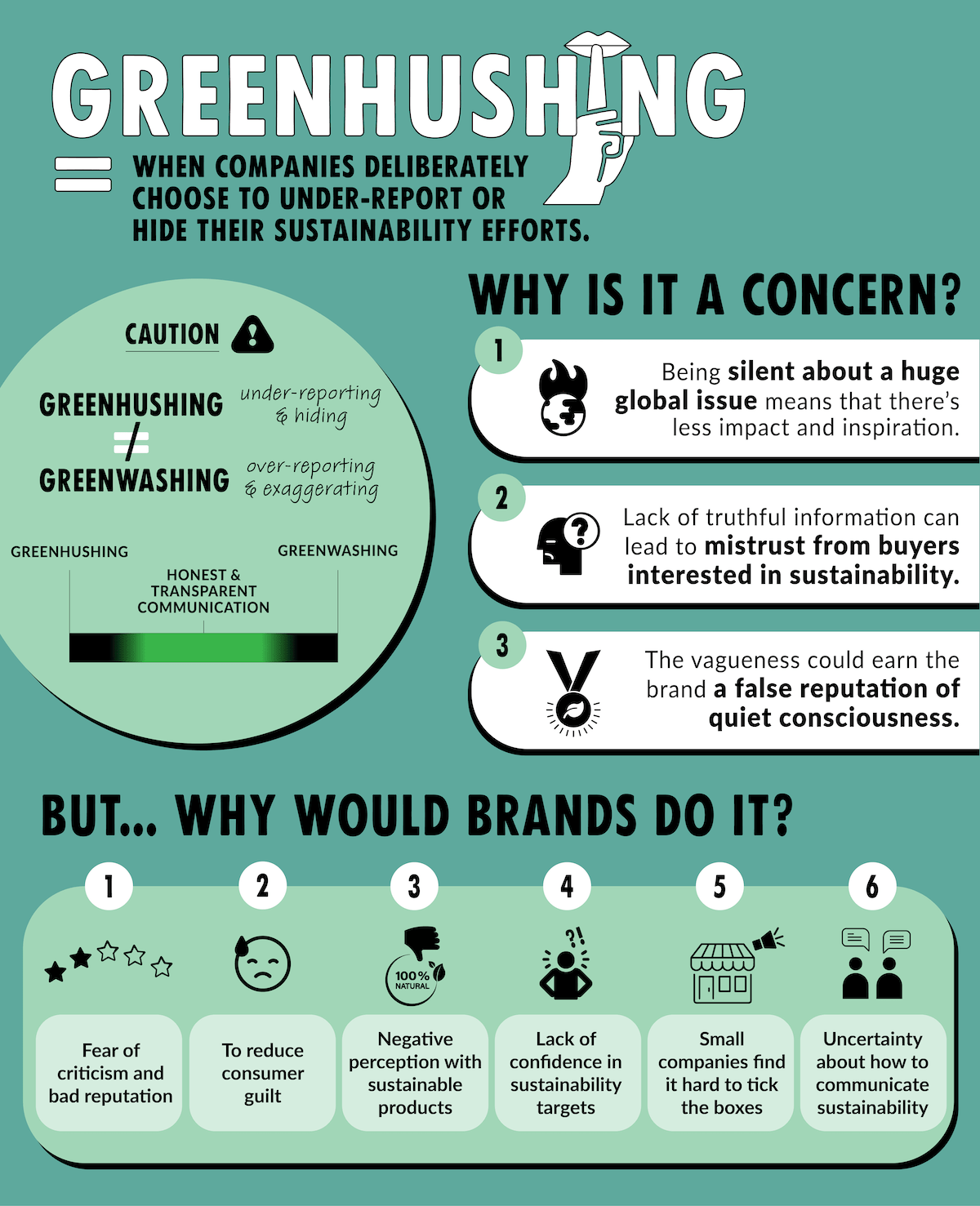Biodiversity & Environment
Greenhushing and its Implications
- 01 Oct 2024
- 6 min read
For Prelims: Greenhushing, ESG (environmental, social, and governance), Greenwashing, Carbon Neutrality, EU’s Greenwashing Directive.
For Mains: Implications of greenhushing in global sustainability transition.
Why in News?
Recently, there has been an increase in carbon-neutral certified firms across the globe, but many choose not to promote their environmental achievements, leading to a global trend known as "greenhushing."
- Firms motivated by altruism and a desire to maintain their social salience are reluctant to communicate and tend to greenhush.
What is Greenhushing?
- Greenhushing occurs when firms under report or strategically withhold information about their environmental goals and achievements.
- Greenhushing firms don’t advertise their green credentials or deliberately remain silent about their future commitments to environmental sustainability.
Why do Firms do Greenhushing?
- Litigation Concerns in the United States: In the US, public companies may face lawsuits if they are seen as prioritising sustainability over shareholder profits.
- This legal risk discourages companies from openly discussing their environmental initiatives.
- Backlash Against ESG: In conservative states within the US, there has been backlash against ESG (environmental, social, and governance) efforts.
- It has prompted some firms to stop discussing their environmental goals to avoid political and regulatory scrutiny.
- Lower Quality of Green Products: Many consumers associate green products with lower quality or higher prices.
- Therefore, many companies are reluctant to promote the environmental benefits of their products which may harm their brand by reinforcing these negative perceptions.
- Avoiding Future Commitments: Companies that are vocal about their sustainability efforts often attract attention and are held to higher standards.
- By remaining silent, firms can avoid expectations of future commitments or pressure to achieve more ambitious environmental goals.
- Avoiding Customer Discomfort: When people are on vacation, they often want to escape from problems like climate change or resource depletion.
- Hence, many businesses in the tourism industry prefer not to communicate their environmental efforts to avoid making their customers uncomfortable.
- Greenwashing Accusations: Public accusations of greenwashing can harm a firm’s image and cause reputational damage to brands. To avoid the negative impacts of criticism, these firms prefer to hide their achievements from external audiences.
- Greenwashing is a term used where a company makes false or misleading statements that their products/services are more sustainable than they are in reality.
- Lack of Customer Demand: Many consumers are either unaware of carbon neutrality or rarely ask for carbon neutral products when making purchasing decisions.
- Without the demand from customers, companies are reluctant to spend money on advertising their carbon neutrality.
Why Firms Become Carbon Neutral Certified?
- Competitive Advantage: Carbon neutrality helps to differentiate themselves from competitors, attract talent and access finance at better terms.
- Maintaining Social Salience: Some firms seek carbon neutrality to maintain their social salience and build stronger relationships with stakeholders to improve public perception and stakeholder trust.
- Ethical Commitment: Ethically motivated firms pursue carbon neutrality because they believe it is the right thing to do.
- These companies are driven by a passion for environmental sustainability and a sense of responsibility to protect the planet.
What are Concerns with Greenhushing?
- Rising Global Trend: A report by climate consultancy South Pole found that 58% of companies surveyed are reducing their climate communication due to increased regulation and scrutiny.
- Reduced Transparency: When companies do not openly communicate their sustainability efforts, it becomes difficult to assess the progress they are making in reducing carbon emissions.
- It reduces the ability to track and verify climate action progress.
- Slowing Global Sustainability Transition: If these businesses withhold information about their environmental efforts, it could delay the adoption of sustainable practices, weakening the overall global effort to combat climate change.
- Domino Effect: Fear of backlash and retaliation from regions or industries that oppose sustainability efforts deter other businesses and companies from adopting sustainable practices.
- Impact on Consumers: When companies are silent about their sustainability achievements, it may lead to consumers continuing to buy products that are less sustainable, inadvertently slowing down the demand for eco-friendly alternatives.
What can be Done to Address Greenhushing?
- Highlighting Sustainability: Companies should emphasise that environmental sustainability is a journey and not a destination.
- Engaging their audiences and highlighting their efforts for continuous improvement can reduce criticism and allay concerns about greenwashing accusations.
- Stronger Regulations and Guidelines: Better regulations can bring clarity, build trust and level the playing field. Eg. EU’s Greenwashing directive bans misleading advertisements and provides consumers with better product information.
- Consumer Education on Sustainability: Increasing consumer awareness about sustainability can help reverse negative perceptions of green products and choose companies that are more sustainable.
|
Drishti Mains Question: Q.Discuss the concept of "greenhushing" in the context of corporate environmental responsibility. What are its implications for sustainability reporting? |





